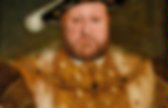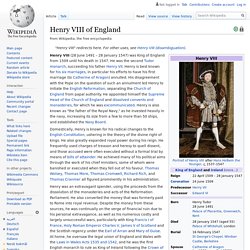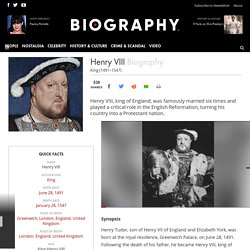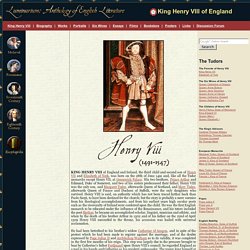

Henry VIII ("Money, Money, Money" by ABBA) I Am King Henry (The Six Wives of Henry the 8th with LYRICS) Henry VIII of England - Wikipedia. 16th-century King of England King of England and Ireland Henry VIII (28 June 1491 – 28 January 1547) was King of England from 1509 until his death in 1547.

He was the second Tudor monarch, succeeding his father Henry VII. Henry is best known for his six marriages, in particular his efforts to have his first marriage (to Catherine of Aragon) annulled. His disagreement with the Pope on the question of such an annulment led Henry to initiate the English Reformation, separating the Church of England from papal authority. Domestically, Henry is known for his radical changes to the English Constitution, ushering in the theory of the divine right of kings. Henry was an extravagant spender, using the proceeds from the dissolution of the monasteries and acts of the Reformation Parliament. Henry's contemporaries considered him an attractive, educated, and accomplished king.
Early years Early reign Eighteen-year-old Henry VIII after his coronation in 1509 France and the Habsburgs Succession Public image. BBC History - Henry VIII. King of England. Henry VIII - King. Henry VIII, king of England, was famously married six times and played a critical role in the English Reformation, turning his country into a Protestant nation.

Synopsis Henry Tudor, son of Henry VII of England and Elizabeth York, was born at the royal residence, Greenwich Palace, on June 28, 1491. Following the death of his father, he became Henry VIII, king of England. He married six times, beheaded two of his wives and was the main instigator of the English Reformation. His only surviving son, Edward VI, succeeded him after his death on January 28, 1547. Childhood and Early Adulthood Henry Tudor, the son of Henry VII of England and Elizabeth York, was born on June 28, 1491, at the royal residence, Greenwich Palace, in Greenwich, London, England. The patriarch, Henry VII, wanted to affirm his family's alliance with Spain, so he offered his young son Henry to Arthur's widow.
Henry was good-natured, but his court soon learned to bow to his every wish. Henry VIII - British History. My TV provider is not listed.

Why not? We are currently working on adding more TV providers. Please check back frequently to see if your TV provider has been added. Why do I need to log in to watch some video content? Viewers who verify their subscription to a TV provider get access to a deeper catalog of video content, including more full episodes. I am able to watch on TV. This service is only available through participating TV providers. How much does it cost to access all of the video content? Accessing video content is free, however, you will need to verify your TV provider subscription by logging in in order to access all of our video content. Can I watch videos if my TV provider isn't currently supported? Yes! What kind of programming is available if I log in?
You will get access to more full episodes than ever before. How often is new video added to the website? There will be new episodes and web exclusives added every day. How quickly does a new episode get added after it airs on TV? The Life of King Henry VIII (1491-1547). Biography of Henry Tudor, King of England. KING HENRY VIII of England and Ireland, the third child and second son of Henry VII and Elizabeth of York, was born on the 28th of June 1491 and, like all the Tudor monarchs except Henry VII, at Greenwich Palace.

His two brothers, Prince Arthur and Edmund, Duke of Somerset, and two of his sisters predeceased their father; Henry VIII was the only son, and Margaret Tudor, afterwards Queen of Scotland, and Mary Tudor, afterwards Queen of France and Duchess of Suffolk, were the only daughters who survived. Henry VIII is said, on authority which has not been traced farther back than Paolo Sarpi, to have been destined for the church; but the story is probably a mere surmise from his theological accomplishments, and from his earliest years high secular posts such as the viceroyalty of Ireland were conferred upon the child.
Ferdinand died in that year (1516) and the emperor Maximilian in 1519. Nevertheless their rising warned Henry VIII against further doctrinal change. (A. Excerpted from: